Stunning underwater photos that will make you see the ocean in a whole new light
Monica Humphries

- The UN hosted its annual World Oceans Day Photo Contest on June 8.
- The contest received more than 1,400 submissions from around the world.
- From playful sea lions to mammoth sharks, the winning photos capture the stunning underwater world.
These award-winning photos from the UN World Oceans Day Photo Competition transport viewers to a stunning underwater world. This shot of local fishermen in Indonesia by Renee Capozzola won first place in the ocean, life, and livelihoods category.
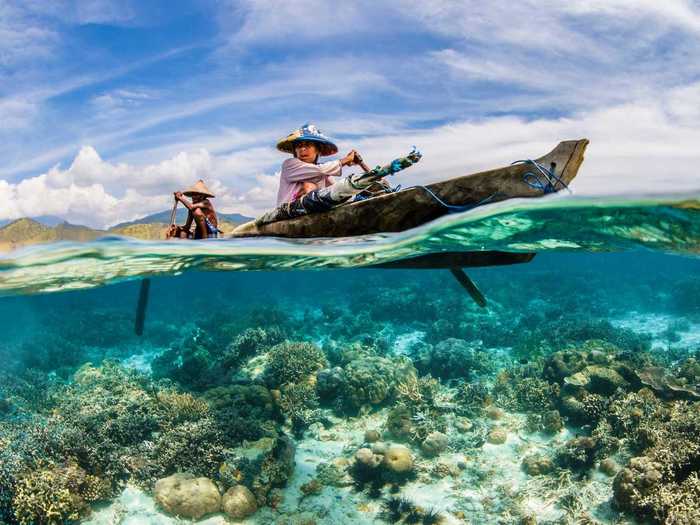
As Renee Capozzola, a US-based photographer, explained in her photo caption submitted to the judges for the UN World Oceans Day photo competition and obtained by Insider, these fishermen were practicing handline fishing near the Solor Archipelago, Indonesia.
Handline fishing is a type of sustainable fishing without poles or nets, according to the International Seafood Sustainability Foundation.
An energetic photo of sardines being chased by a striped marlin earned Jacopo Brunetti second place in the same category.
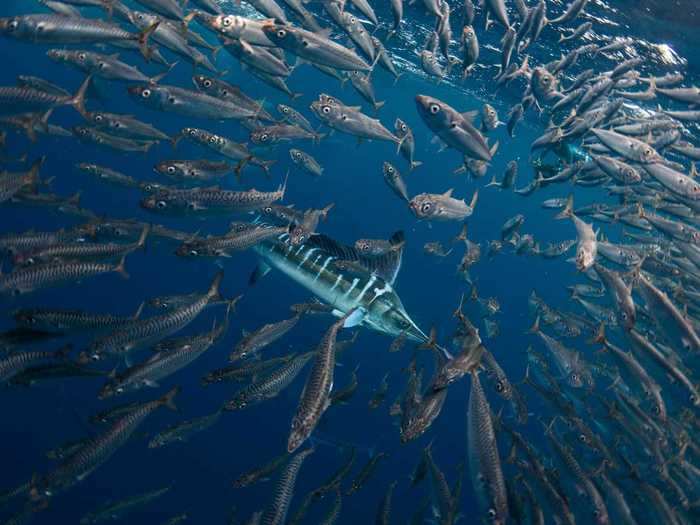
Italy-based photographer Jacopo Brunetti's photograph was taken off the coast of Magdalena Bay, Mexico, according to the UN.
Henley Spiers' image of a diver hunting for tuna with a speargun placed third in the ocean, life, and livelihoods category.
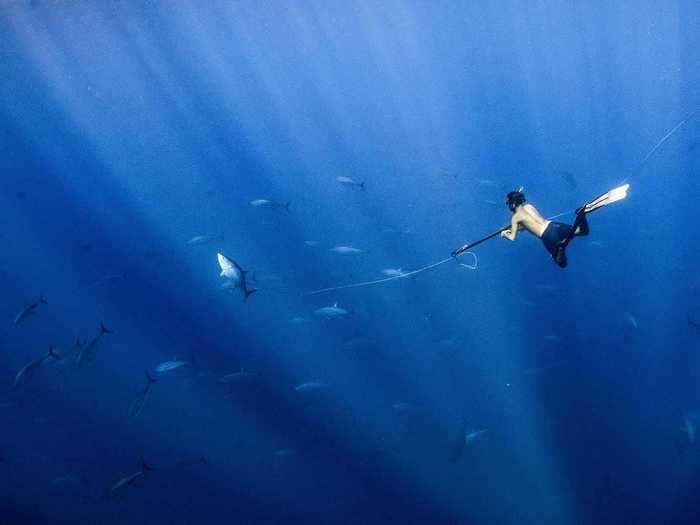
Henley Spiers, a UK-based photographer, took this image of a diver hunting for a yellowfin tuna off the shores of Costa Rica, according to the UN.
In Spiers' caption sent to the UN, the photographer said the local diver named David told him his "life and passion revolved around the rhythms of the ocean."
This bright-blue mollusk, which is a type of soft-bodied animal, earned the photographer Victor Núñez an honorable mention in the ocean, life, and livelihoods category.
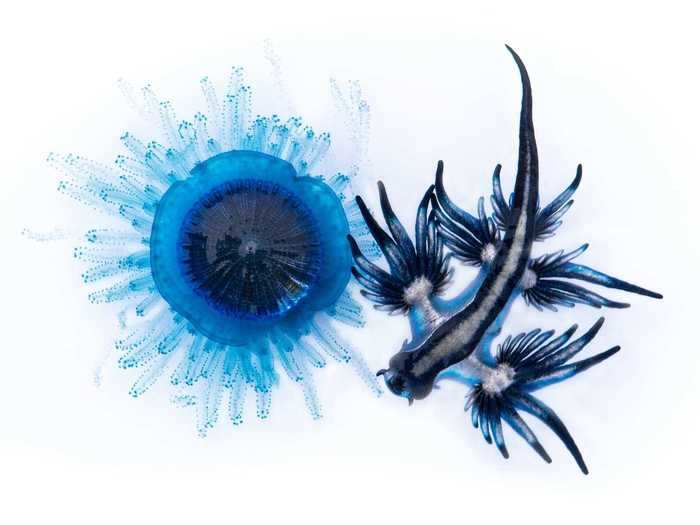
Victor Núñez photographed the mollusk, commonly known as a blue dragon sea slug, off the coast of Spain's Canary Islands, according to the UN.
In the image, the mollusk on the right is eating a jellyfish, the photographer said in the caption he submitted to the UN.
Pawel Zygmunt's aerial shot of the Kallur cliff in the Faroe Islands, Denmark, placed first in the above-water seascapes category.
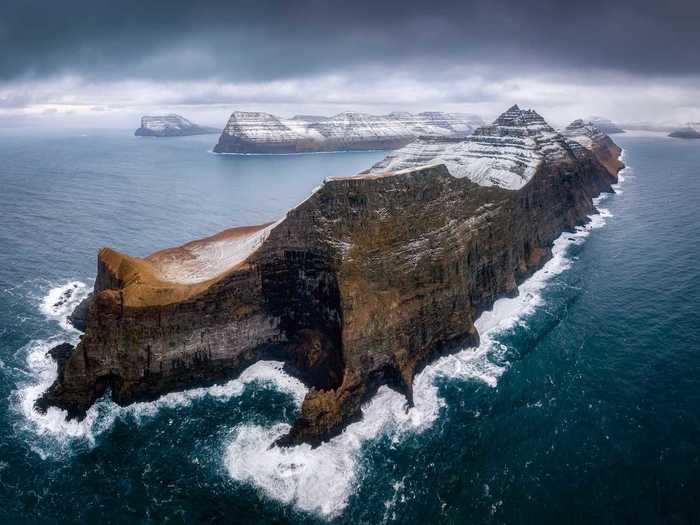
Pawel Zygmunt snapped this image using a drone, according to the UN.
"On the way up I was pummeled by a hail storm and pushed around by strong wind," Zygmunt wrote in his photo caption sent to the UN. "I wasn't sure if I would be able to fully experience this place but the wind dropped a bit and it became safer to explore. But I managed to capture Kalsoy Island from a slightly different perspective."
Christophe Mason-Parker's bird's-eye view of two islets in the Seychelles Islands placed second in the above-water seascapes category.
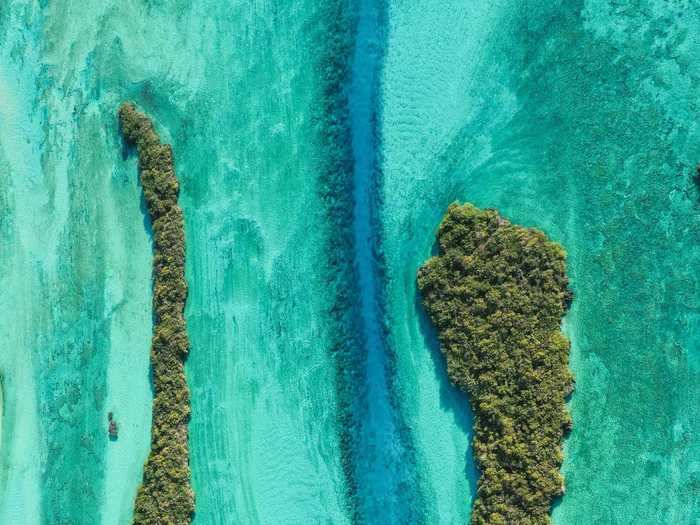
Christophe Mason-Parker's image shows the Passe Dubois, a tidal channel that intersects Ilot Emili and Ilot Yangue, two islets in the Seychelles.
Rafael Fernandez's aerial photo of a blue whale - the largest animal in the world - earned third place in the above-water seascapes category.
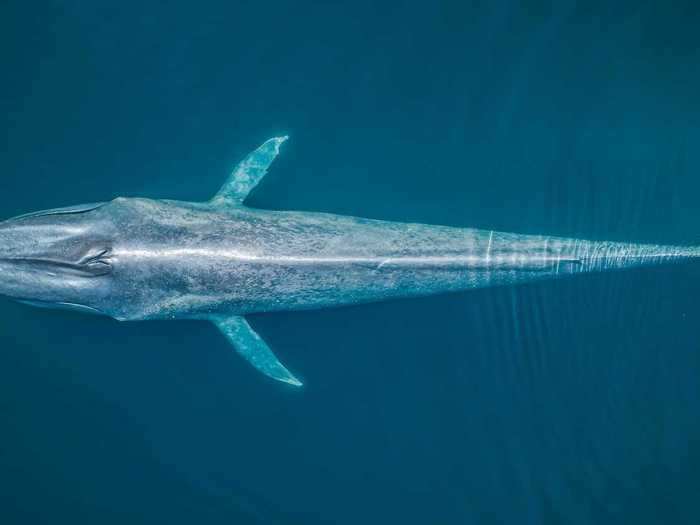
Rafael Fernandez took this image from above off the coast of Mexico's Baja California Sur, according to the UN.
"While sailing in the open sea, it was amazing to see the whale from far away, the sea was flat and the conditions were perfect," Fernandez told the UN in a photo caption sent to Insider.
This image of a curious California sea lion pup basking in the morning sun earned photographer Matthew Meier an honorable mention in the above-water seascapes category.
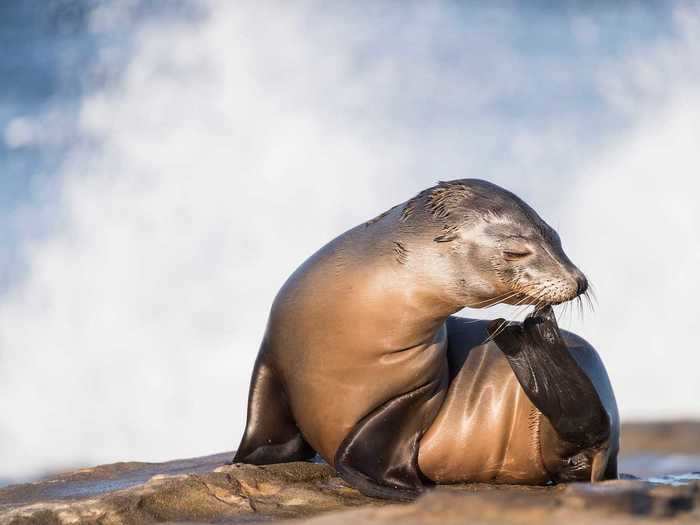
"The pup was warming up on the rocky shoreline after a recent swim in the cold water, as waves from the Pacific Ocean crashed in the background," Matthew Meier told the UN of the photo, which he took in La Jolla, California.
When it came to the digital ocean photo art category, Francisco "Paco" Sedano won first place for his altered image of a moray eel.
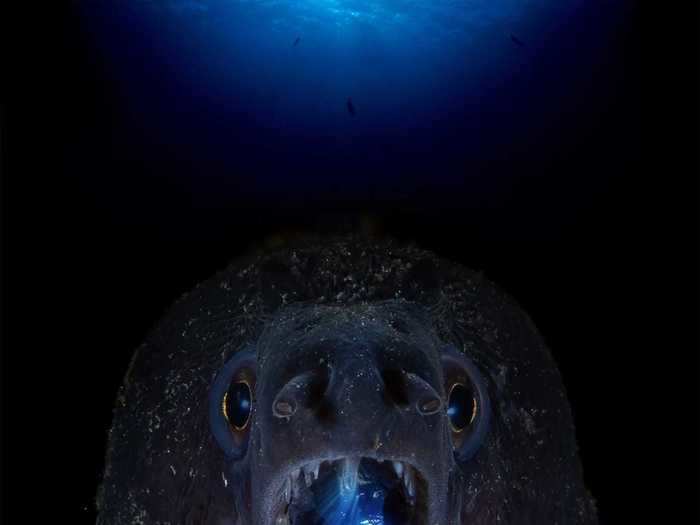
Francisco "Paco" Sedano told the UN that his edited image was inspired by the Disney movie, "Aladdin, the Cave of Wonders."
"There is a hidden cavern filled with all sorts of riches and magical artifacts that are guarded by a lion head," Sedano wrote in the caption of his photo. "This interpretation isn't very different, however, the cave is guarded by a moray eel and filled with precious species."
Photographer Brett Stanley earned second place in the digital ocean photo art category for this image of a blindfolded model leaving an underwater trail of plastic to comment on how plastic consumption impacts the oceans.
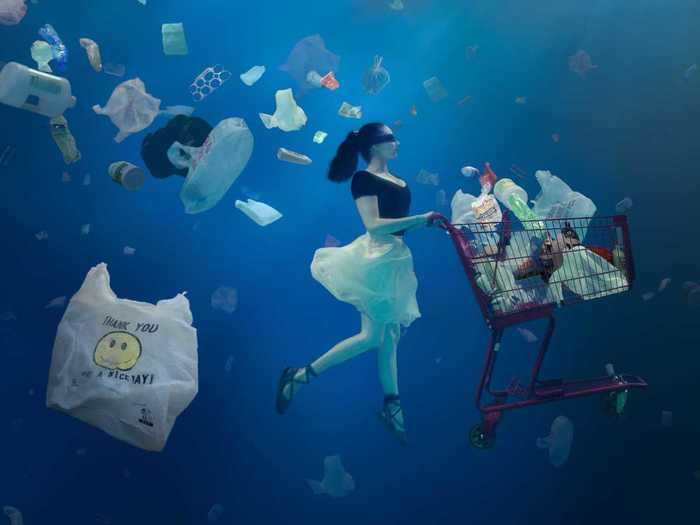
The idea behind Brett Stanley's image of model Christine Ren was to "look at the blindness consumers have when it comes to plastics, and their effect on the oceans — blindly buying goods and wish-cycling them in the hopes of allaying their own guilt," the photographer said in his submission to the UN.
Renata Romeo's colorful silhouette of a woman placed third in the digital ocean photo art category.
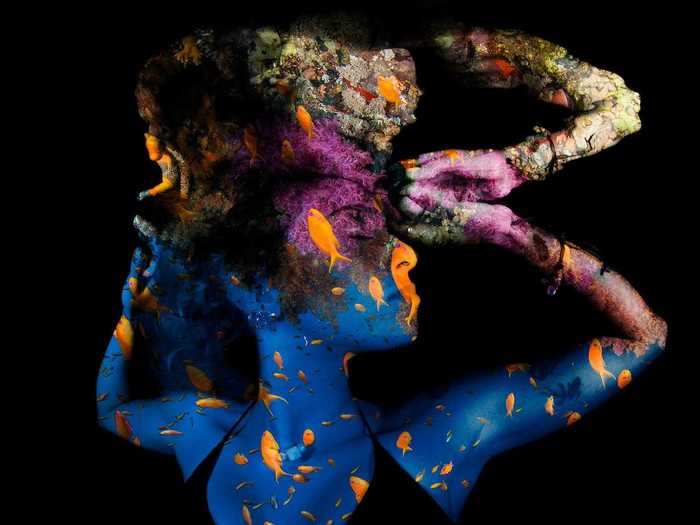
Italy-based photographer and artist Renata Romeo's striking image of a woman's silhouette filled with soft coral, organ pipe coral, and Anthias fish impressed the judges.
Sayaka Ichinoseki's photo of tiny fish eggs with large eyes earned the top spot in the faces of the sea category.
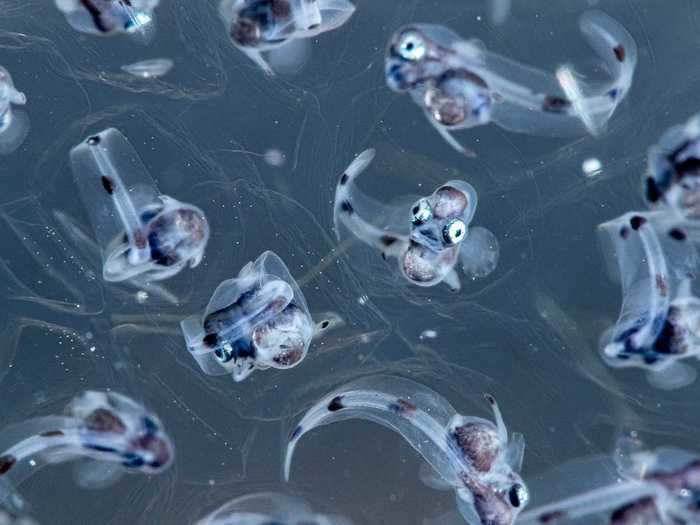
Sayaka Ichinoseki, a Japan-based photographer, told the UN she believes the fish eggs in this image taken in Hokkaido are from a yellow goosefish.
The eggs were 2 millimeters in size and about ready to hatch, the photographer said.
An image of a curious little amphipod by Sam Briggs placed second in the faces of the sea category.
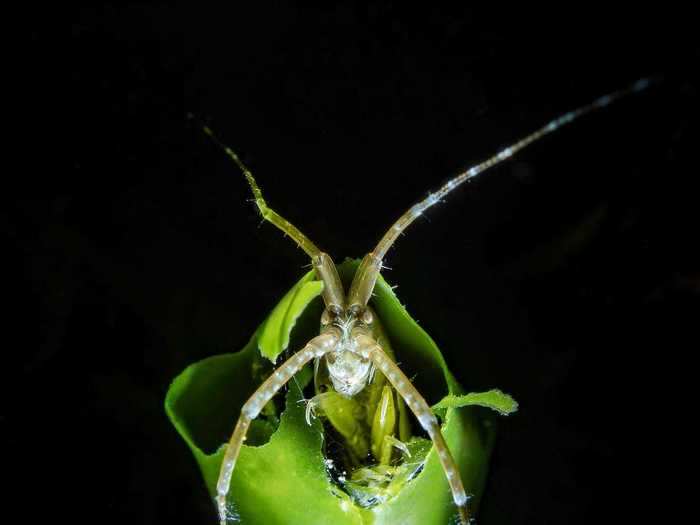
US-based photographer Sam Briggs took this image in California's Bodega Bay, according to the UN.
The photo features an amphipod, a type of crustacean, staring out of its dwelling, which was constructed of sea lettuce and amphipod silk.
Evans Baudin's fear-inducing image of a shortfin Mako shark at sunset in Mexico placed third in the faces of the sea category.
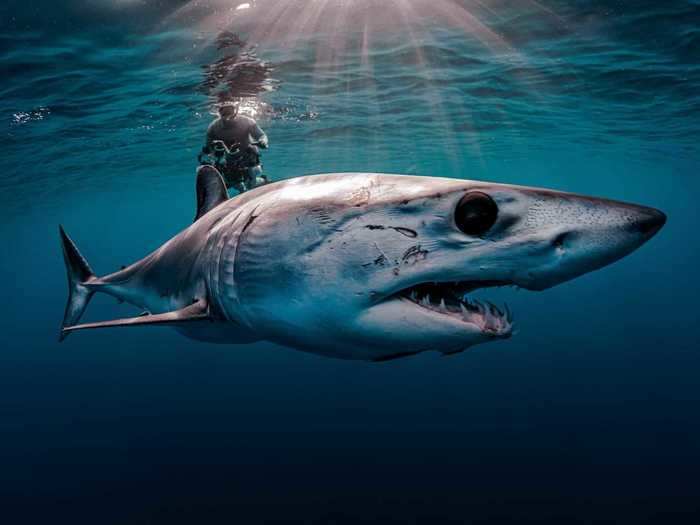
Evans Baudin took this photo off the coast of Mexico's Baja California Sur, according to the UN.
An eerie image by Tom St George of a cave diver in a beautiful underground cave in Mexico placed first in the ocean discoveries category.
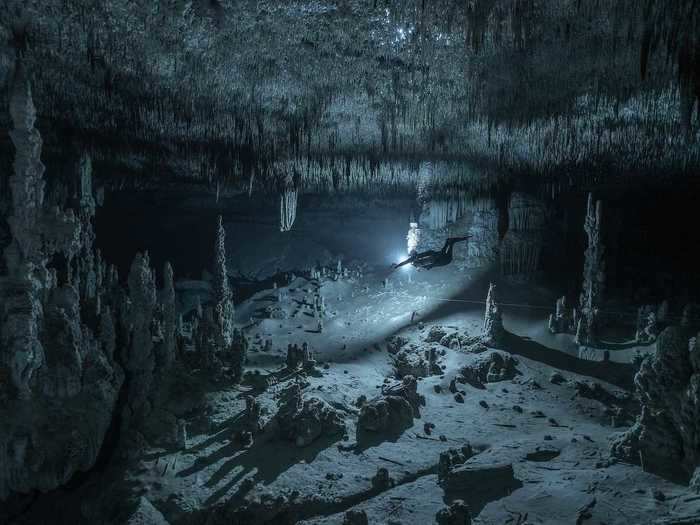
According to the photo caption, Tom St George's first-place image shows underwater views from the Yucatán Peninsula in Mexico, which is home to the world's largest underwater cave system, according to National Geographic.
Second place in the ocean discoveries category went to Hannes Klostermann's photograph of a school of skipjack tuna surrounding sardines.
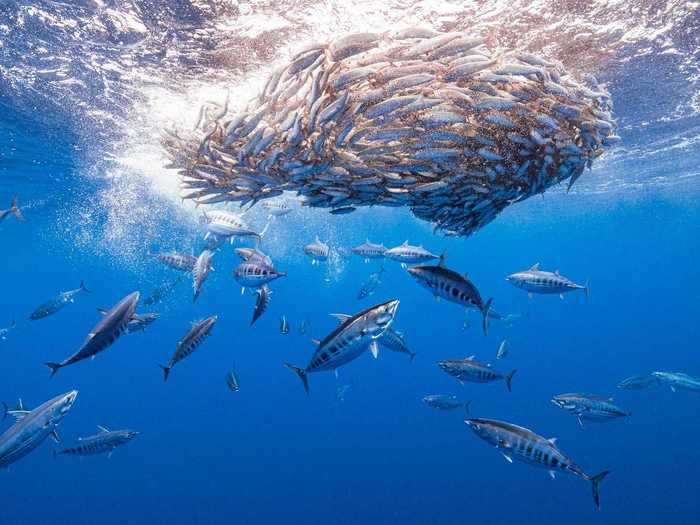
Hannes Klostermann's image — which was also taken in Mexico's Baja California Sur, according to the photo caption — captures tuna that are preying on a sardine bait ball, which occurs when fish swarm in a tightly packed formation.
Sirachai Arunrugstichai's photo of a watery grave that has the skeletal remains of a Bryde's whale became a third-place winning photograph in the ocean discoveries category.
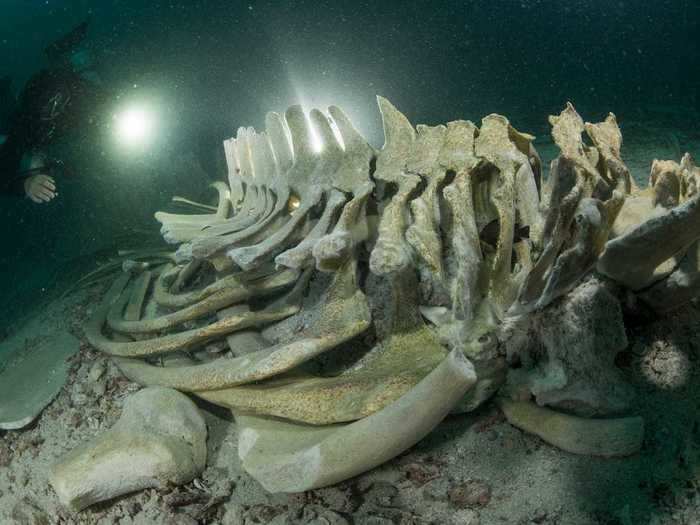
Sirachai Arunrugstichai photographed a diver exploring the remains of a Bryde's whale on the ocean floor at the Mu Koh Lanta National Park in Thailand, according to the UN.
Nur Tucker's photograph of a sea lion playing in a cave in Mexico was the winner of the underwater seascapes category.
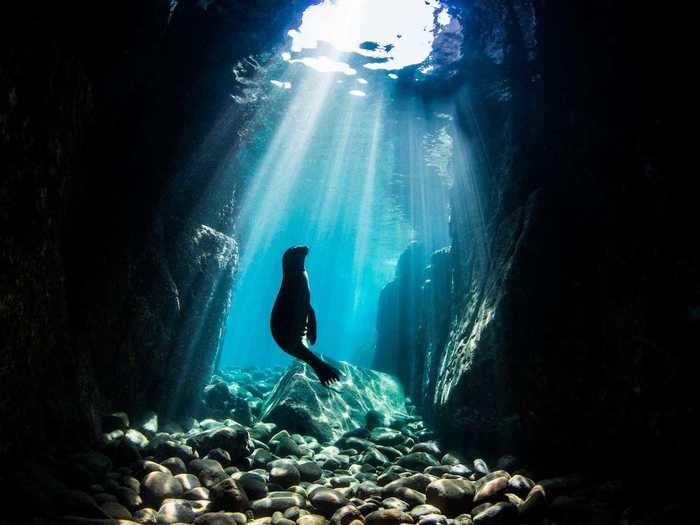
Nur Tucker's first-place photograph of a sea lion pup was taken in Los Islotes in Mexico, according to the UN.
A mystical image of thousands of sardines taken by Marchione Giacome in the Philippines earned second place in the underwater seascapes category.
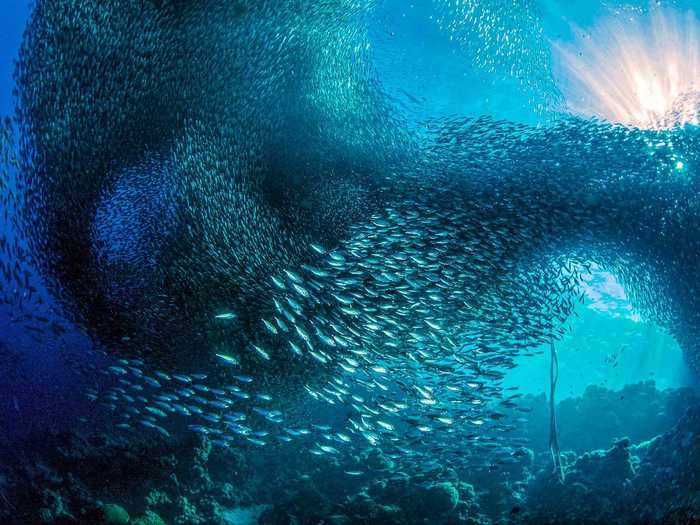
Marchione Giacom took this image off the coast of Cebù Island in the Philippines, according to the UN.
Titled "The Cloud," the photo shows sardines that form masses large enough to obscure sunlight.
Finally, third place in the underwater seascapes category went to Kevin De Vree for his image of a brightly colored venus sea fan off the coast of Indonesia.
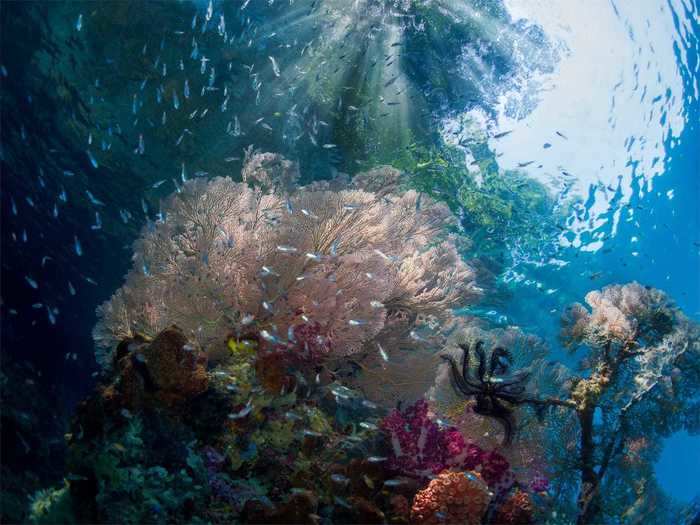
Kevin De Vree titled the photo "Garden of Eden," according to the caption for his photo, which includes sunbeams piercing through the water outside of West Papua, Indonesia.
You can see last year's winners of the UN World Oceans Day photo competition here.
READ MORE ARTICLES ON
Popular Right Now
Popular Keywords
Advertisement